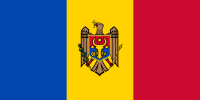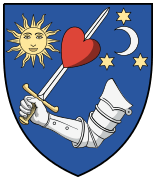Covasna
| Covasna Kovászna | ||
|---|---|---|
| Town | ||
|
| ||
| ||
 Location of Covasna | ||
 Covasna Location of Covasna | ||
| Coordinates: 45°50′57″N 26°11′7″E / 45.84917°N 26.18528°ECoordinates: 45°50′57″N 26°11′7″E / 45.84917°N 26.18528°E | ||
| Country |
| |
| County | Covasna County | |
| Status | Town | |
| Government | ||
| • Mayor | Gyerő József (UDMR) | |
| Area | ||
| • Total | 155.11 km2 (59.89 sq mi) | |
| Population (2004) | ||
| • Total | 11,369 | |
| Time zone | EET (UTC+2) | |
| • Summer (DST) | EEST (UTC+3) | |
| Website | www.primariacovasna.ro | |
Covasna (Romanian pronunciation: [koˈvasna], Hungarian: Kovászna, Hungarian pronunciation: [ˈkovaːsnɒ], German: Kowasna) is a town in Covasna County, Transylvania, Romania, at an altitude of 550–600 m. It is known for its natural mineral waters and mofettas.
The town administers one village, Chiuruș (Hungarian: Csomakőrös). The village has a population of 451 and has an absolute Székely Hungarian majority.
Demographics
According to the 2011 Census, Covasna has 10,265 inhabitants. It has a Hungarian majority: 7,549 or 66.4%. 3,672 (32.3%) Romanians also live in the town.
Demographic movement according to the censuses:

History
- 1567 - First mentioned in a document.
- 1880 - Covasna has flourished as a health resort since the 1880s
- 1952 - Covasna became a town.
- 1970's - Several hotels and cure centers were built in Covasna.
- 2000's - Covasna is a nationally important spa town in Romania, famous for cardiovascular trataments.
International relations
Twin towns – Sister cities
Covasna is twinned with:
 Pápa, Hungary
Pápa, Hungary Nagykanizsa, Hungary
Nagykanizsa, Hungary Gyula, Hungary
Gyula, Hungary Balatonfüred, Hungary
Balatonfüred, Hungary Csenger, Hungary
Csenger, Hungary Călărași, Moldova
Călărași, Moldova
Natives
The Hungarian explorer and linguist Sándor Kőrösi Csoma was born in Chiuruș/Csomakőrös in 1784. Kőrösi is widely seen as the founder of Tibetology, he was the compiler and author of the first Tibetan-English dictionary and grammar book. He died in Darjeeling, India in 1842.
A statue in his honour was erected in the centre of the village in 1972 and there is an exhibition in the cultural centre.
References
| Wikimedia Commons has media related to Covasna. |

